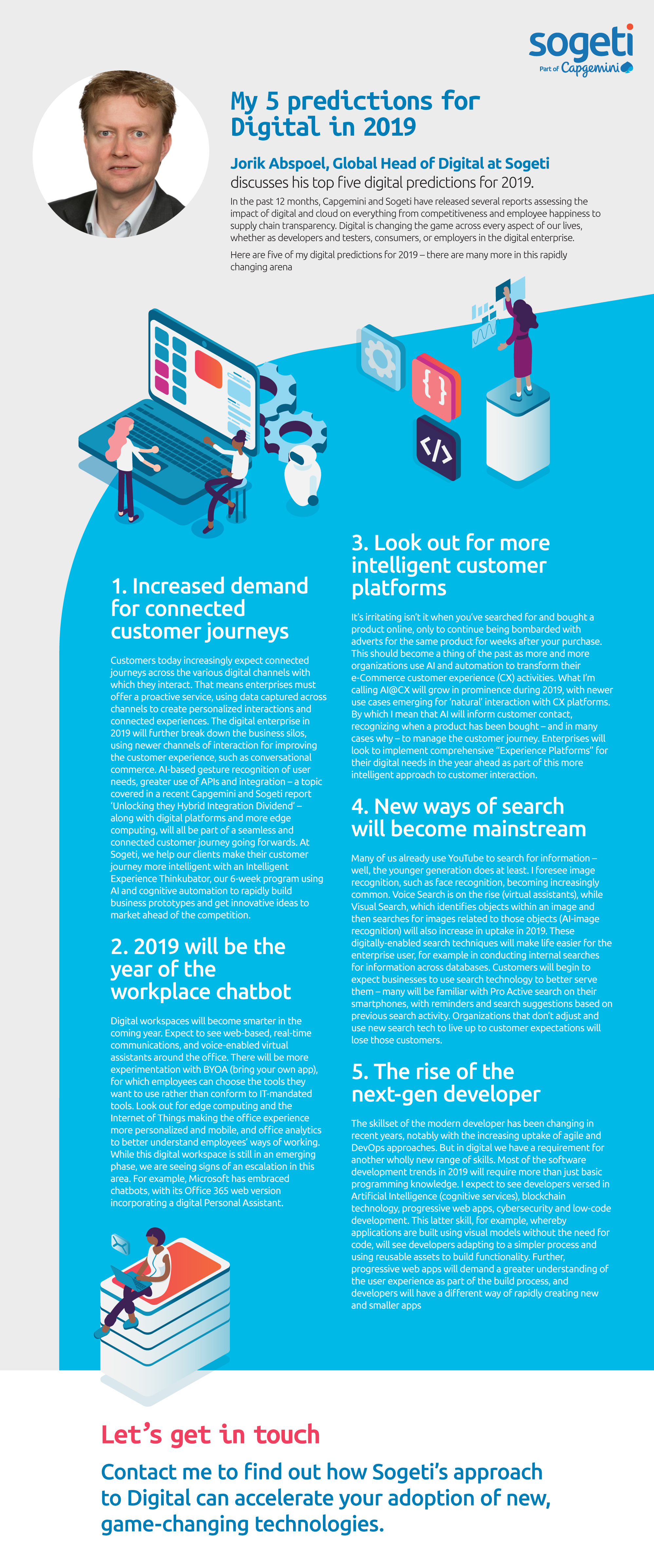5 Predictions for Digital in 2019
Jorik Abspoel, Global Head of Digital, Sogeti, shares with us his top 5 predictions for Digital in 2019.

In the past 12 months, Capgemini and Sogeti have released several reports assessing the impact of digital and cloud on everything from competitiveness and employee happiness to supply chain transparency. Digital is changing the game across every aspect of our lives, whether as developers and testers, consumers, or employers in the digital enterprise.
Here are five of my digital predictions for 2019 – there are many more in this rapidly changing arena:
1. The rise of the next-gen developer
The skillset of the modern developer has been changing in recent years, notably with the increasing uptake of agile and DevOps approaches. But in digital we have a requirement for another wholly new range of skills. Most of the software development trends in 2019 will require more than just basic programming knowledge.
I expect to see developers versed in Artificial Intelligence (cognitive services), blockchain technology, progressive web apps, cybersecurity and low-code development. This latter skill, for example, whereby applications are built using visual models without the need for code, will see developers adapting to a simpler process and using reusable assets to build functionality. Further, progressive web apps will demand a greater understanding of the user experience as part of the build process, and developers will have a different way of rapidly creating new and smaller apps.
2. 2019 will be the year of the workplace chatbot
Digital workspaces will become smarter in the coming year. Expect to see web-based, real-time communications, and voice-enabled virtual assistants around the office. There will be more experimentation with BYOA (bring your own app), for which employees can choose the tools they want to use rather than conform to IT-mandated tools.
Look out for edge computing and the Internet of Things making the office experience more personalized and mobile, and office analytics to better understand employees’ ways of working. While this digital workspace is still in an emerging phase, we are seeing signs of an escalation in this area. For example, Microsoft has embraced chatbots, with its Office 365 web version incorporating a digital Personal Assistant.
3. Look out for more intelligent customer platforms
It’s irritating isn’t it when you’ve searched for and bought a product online, only to continue being bombarded with adverts for the same product for weeks after your purchase. This should become a thing of the past as more and more organizations use AI and automation to transform their e-Commerce customer experience (CX) activities.
What I’m calling AI@CX will grow in prominence during 2019, with newer use cases emerging for ‘natural’ interaction with CX platforms. By which I mean that AI will inform customer contact, recognizing when a product has been bought – and in many cases why – to manage the customer journey. Enterprises will look to implement comprehensive “Experience Platforms” for their digital needs in the year ahead as part of this more intelligent approach to customer interaction.
4. New ways of search will become mainstream
Many of us already use YouTube to search for information – well, the younger generation does at least. I foresee image recognition, such as face recognition, becoming increasingly common. Voice Search is on the rise (virtual assistants), while Visual Search, which identifies objects within an image and then searches for images related to those objects (AI-image recognition) will also increase in uptake in 2019. These digitally-enabled search techniques will make life easier for the enterprise user, for example in conducting internal searches for information across databases.
Customers will begin to expect businesses to use search technology to better serve them – many will be familiar with Pro Active search on their smartphones, with reminders and search suggestions based on previous search activity. Organizations that don’t adjust and use new search tech to live up to customer expectations will lose those customers.
5. Increased demand for connected customer journeys
Customers today increasingly expect connected journeys across the various digital channels with which they interact. That means enterprises must offer a proactive service, using data captured across channels to create personalized interactions and connected experiences. The digital enterprise in 2019 will further break down the business silos, using newer channels of interaction for improving the customer experience, such as conversational commerce.
AI-based gesture recognition of user needs, greater use of APIs and integration – a topic covered in a recent Capgemini and Sogeti report ‘Unlocking they Hybrid Integration Dividend’ – along with digital platforms and more edge computing, will all be part of a seamless and connected customer journey going forwards. At Sogeti, we help our clients make their customer journey more intelligent with an Intelligent Experience Thinkubator, our 6-week program using AI and cognitive automation to rapidly build business prototypes and get innovative ideas to market ahead of the competition.
+31 (0)6 277 46 380

+31 (0)6 277 46 380


![[Missing text '/pageicons/altmail' for 'English']](/Static/img/email.png)